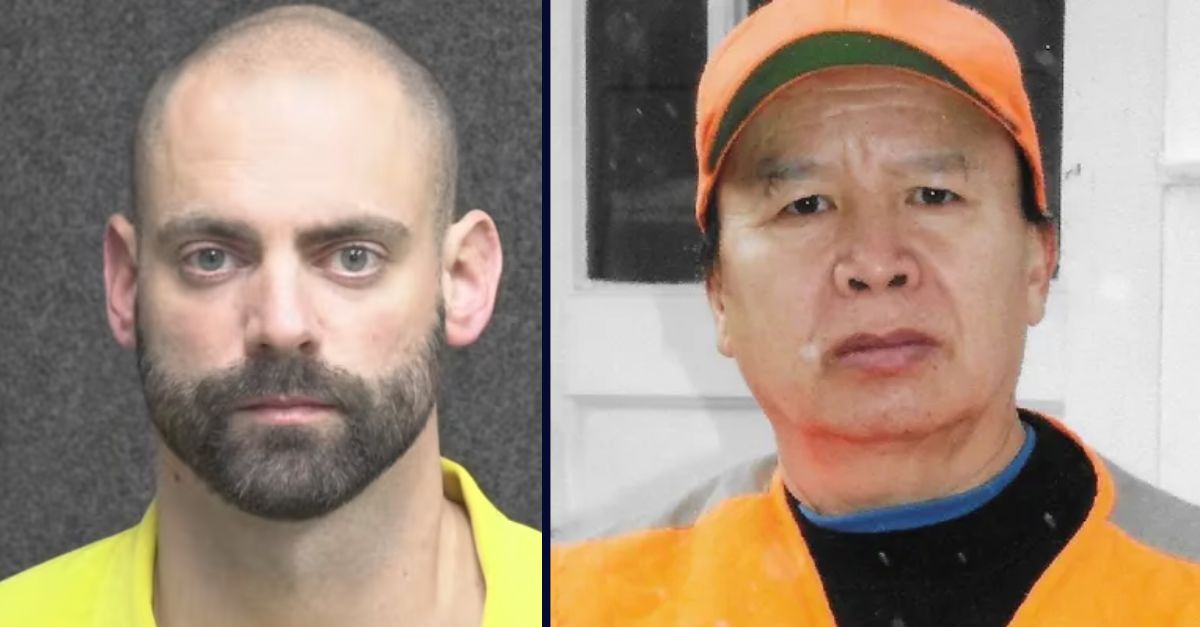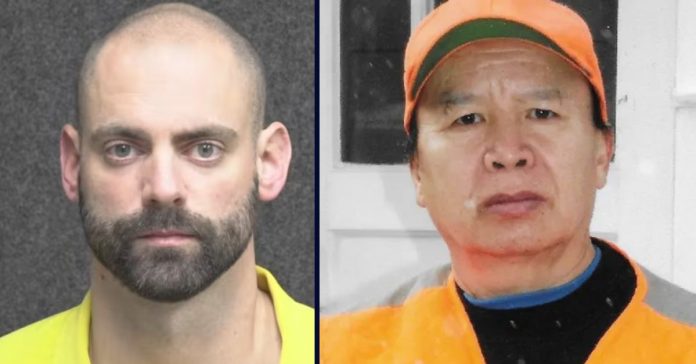
Left: Thomas Olson (Michigan State Police); Right: Chong Yang (GoFundMe)
A white man accused of harboring anti-Asian bigotry will spend over 20 years behind bars for the cold case murder of a Hmong hunter who was shot and killed during deer season on Michigan state land in 2018.
Thomas Charles Olson, 35, was convicted by a Clinton County jury on one count each of murder in the second degree and felony firearm possession in February. Then, and now, he maintains his innocence.
Chong Moua Yang, 68, was shot in the back of the head while hunting in one of his frequent spots, the Rose Lake State Wildlife Area in Bath Township, on Nov. 16, 2018. His murder went unsolved for years.
In December 2022, Olson and another man, Robert Rodway, 35, were arrested on charges of felony murder and felony firearm possession in the case. Charges against Rodway were dismissed without prejudice by Michigan Attorney General Dana Nessel in September 2023.
Initially, the pair were charged with felony murder on the theory that they also stole Chang’s belongings after his murder. The second-degree murder charge was added as an alternative theory in 2023.
“I am grateful for the dedicated work of the prosecutors in my office, as well as the determination of the Bath Township Police Department and the FBI in their yearslong pursuit in resolving this cold case,” Nessel said in a press release earlier this year. “This murder shocked the Bath Township and Michigan hunting communities, and it is our hope that this conviction may bring some peace and healing to Mr. Yang’s friends and family.”
Members of Yang’s family pushed for a steep sentence, according to a courtroom report by the Lansing State Journal.
Michigan’s 29th Circuit Judge Shannon Schlegel was happy to oblige — sentencing Olson to spend at least 22-and-a-half years, and up to 60 years, in prison on the murder charge; he was also sentenced to two years in prison for the firearm possession charge. Under state law, the sentence for the lesser charge must be served first. The since-condemned man also received credit for nearly a year of time served in pretrial detention.
“(The murder) not only robbed my dad of his belongings, it robbed me of not having my dad give me away on my wedding day,” Maivue Yang, one of the victim’s daughters, told the court during Olson’s sentencing hearing on Monday, according to the paper.
During trial, prosecutors relied on text messages between Olson and his hunting partner on the day of the murder. Those messages contained jokes about Yang’s death, discussed “the killing field,” racial slurs, shooting at sounds, and hunting human beings.
“A couple of cold-blooded killers revisiting the crime scene,” one such message, attached to an April 2020 photo of Olson and his friend at Rose Lake, read, according to the Journal.
In another message, one of the men sent the other an image of the reward poster for information about Yang’s death put up by his family. This photo was captioned: “They haven’t caught ya.”
Defense attorneys argued the messages were dark jokes but the state argued they were admissions by the accused.
“I find those messages extremely offensive,” Schlegel said. The judge also called the messages “abhorrent,” and said “it’s not OK.”
Prosecutors also used GPS data to show that Olson was in the general area of where Yang was killed that day. The defense said that data only showed Olson being within 600 yards of the deceased — not necessarily close enough to prove he could have shot and killed him.
Yang was wearing his orange hunting outfit on the day he died. His family also has a still-active GoFundMe for legal expenses.
The state admittedly did not provide a motive. According to the paper, Assistant State Attorney General Richard Cunningham suggested that Olson fired a shotgun at Yang intending to scare him — possibly because of the anti-Asian bias shown in the text messages.
While largely circumstantial, the state’s case included the presence of Olson’s DNA on a plastic bag containing a bottle of deer spray. That bag was discovered several hundred yards away from Yang’s body. Olson readily admitted it was his but insisted he had nothing to do with the murder, according to an earlier courtroom report. Cunningham, arguing the felony murder theory, suggested Olson used the bag to carry some of Yang’s stolen goods. The deceased man was found without his headlamp, knife, backpack and shotgun.
There were also cellphones searches which implicated Olson. He had looked for information about the incident before police publicly revealed a hunter had been killed. One of his defense attorneys, however, said Olson went back to Rose Lake the next morning and noticed a substantial police presence in the area — prompting him to search for information about what happened.
After roughly 18 hours over three days, jurors convicted the civic-minded killer; Olson previously served as Clinton County’s green space coordinator for five years and was the president of the Friends of the Maple River, an environmental nonprofit organization.
“The question still remains, ‘Why?,”” Joseph Yang, a family member, told the Journal earlier this year. “To be shot in the back of the head senselessly, for no apparent reason, we still want to know why.”
Olson, for his part, did not have any kind of an explanation.
During sentencing, he said he “absolutely nothing to do” with the killing and wanted Yang’s family to get “the true justice they deserve.”
Yang was eulogized as a success story within a broader narrative.
“He came to the United States looking for the American dream, and for his purposes he obtained the American dream,” Joseph Yang told the Journal days after the slaying. “He raised his family, he worked, he paid his taxes, he owned a home. For him, he had made it.”
Have a tip we should know? [email protected]

